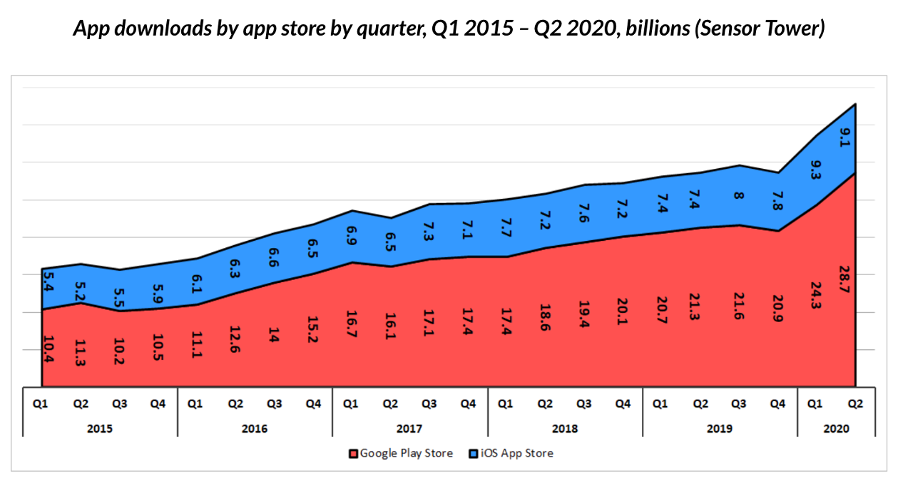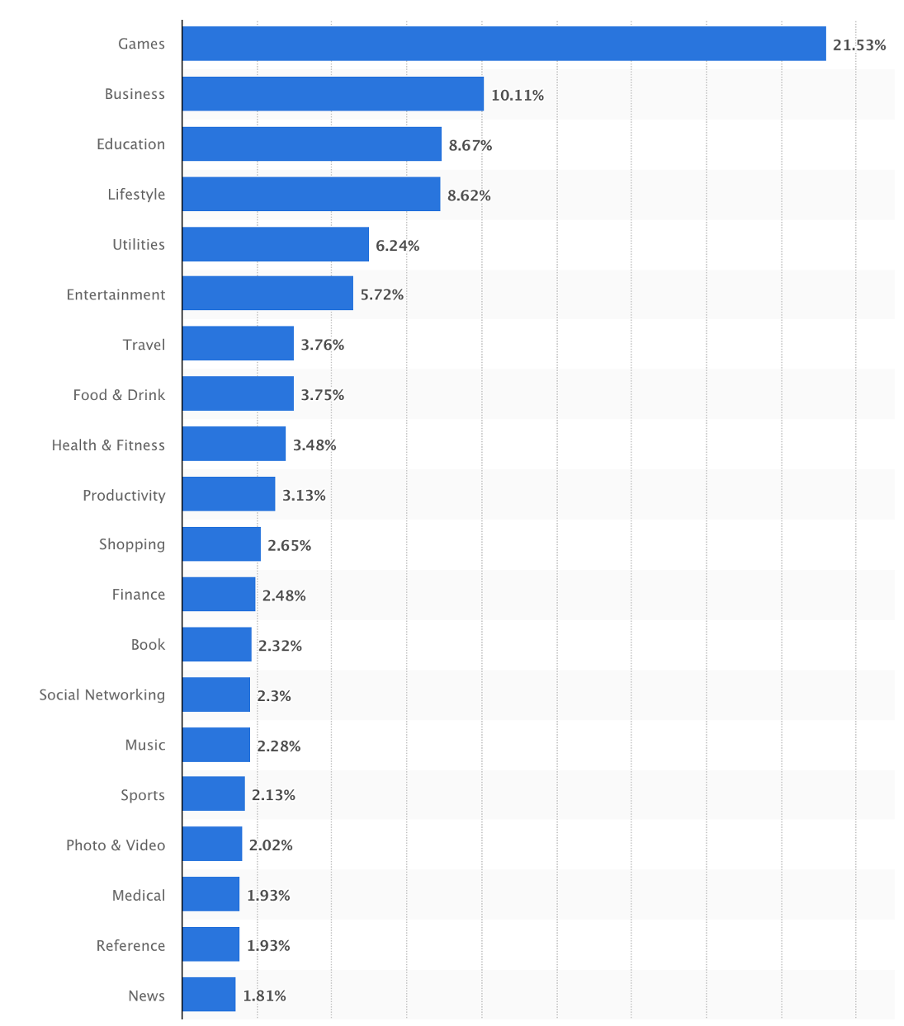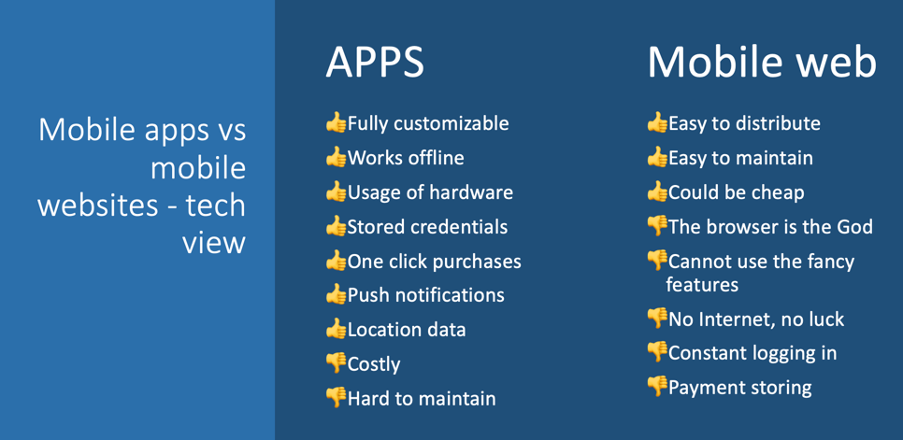It’s like politics, we all have our opinion, and we think that the opposing opinion is very wrong, since I don’t behave that way. Back in the day I used to be a very pro browser and the app should only be built in a case of an emergency. This wasn’t due the fact that I personally preferred using browser apps, but due to the fact that I was working for a company that built browser apps. The other significant factor to make my opinion lean towards browsers was that the stats showed that the traffic in the browser app is usually greater than in the downloadable apps. But it’s not that simple. Let’s dig a bit deeper into this issue.
The issue itself is very relevant and big for many companies simply due the fact that as consumers, we spend some time using mobile devices. According to eMarketer, we spend about 3,5 hours staring at our phones daily! Of that 3,5 hours about 90 % is spent using apps and only 10 % using browser. So, if we just fixate to this number, everyone should build apps, but again, it’s not that simple.
There are some apps in the stores and it’s quite hard to get your voice heard. The chart shows how many apps were downloaded by quarter in a year and it’s quite simple to make a quick calculation that your company’s app might face some stiff competition when it comes to the battle of market position in the markets.

Also, another relevant issue to keep in mind is that of that 90 % of time spent with apps, the usage leans heavily towards some specific types of apps. The brand apps, or shopping apps are not in the top of this list which shows the most downloaded apps per category.

OK, so people prefer to use apps, but there are so many of them, that just building an app doesn’t solve the issue, since how can I make my voice heard? There are also some very relevant points that make the scale lean towards browser services.
Consumers don’t like to download
- We all know this… We have so many unused apps on our devices and downloading a new one is also a burden.
- Google shows the contents of the websites but doesn’t do so for the apps. Also think of your own behavior, if you are thinking of booking a restaurant table, do you go to app/play store to search for restaurants, or do you google it?
Tech and money
If the customers don’t like to download apps, why are apps in so much demand or used so frequently?
Apps are quite a bit more usable than browsers. Browser is a limitation: It dictates what can be done and it’s dependent on the connection speed. Also, some features are simply not available in the browser world, which might make the difference in your case as well. For example, the payment methods in apps are typically much smoother (one click) in the app vs browser. The New PSD2 regulation in the EU area actually made this even more visible towards downloadable apps. If a user prefers to use a mobile payment method in the app, the 3d security check can be avoided when doing app switch payments compared to payments made in the browser world. Another very annoying issue in the browser world is the logging in. Apps work nicely remembering your login credentials and if extra security is needed, some biometric identifiers can be easily implemented. Biometric identifiers are slowly and carefully coming to browsers as well but seems like the combination of the OS and browser with biometrics is hard to make work 100 % of the time, whereas in the app, it seems to work perfectly.
I used to be a CEO of a company making browser apps and now working in a company making both downloadable and browser apps, it was first hard for me to understand that making a fix or adjustment to an app might take 2 weeks to implement. The fix needs to be made and released both to iOS and Android (we use React native, so it helps a lot though), but then the process of approving it to the stores and then the process of users to update the apps is not quick. In the browser world the fix can be made to the site and in a matter of minutes, it’s live. This issue is also related to money. Doing and maintaining apps is more costly than doing (almost) the same things in the browser world.
Just to save your time, I’ve made a list of features and issues that you might consider when making the decision between the two means:

Decision time
So, what to do? The question is technical, tactical and strategic. When it comes to tech, the app will win, there is no question about that. It’s just a matter of which features and use cases are relevant to your business and which are not. As a bit of a geek, I like to point out these technical limitations, but think of your own behavior, when you use LinkedIn on your phone, do you use app or web?
When it comes to tactical issues, we must give more love to browsers. The website is easier to distribute and it’s more reachable. Google will love your website and people love Google. This also relates to the fact that if you make an app and think that the world is ready, you are wrong on so many levels. With websites, the user actually might accidentally wander to your website thanks to Google, but this does not work in the apps. Investing time and money to apps is needed to gain loyal users.
The decision is in the end strategic. If you are looking to serve visitors that are not going to be using your service that often, so that they don’t mind the extra clicks when buying or logging in, or they don’t mind missing out on a campaign since they couldn’t get a push notification but got an email that went to spam, or they don’t mind if the service’s response time is a bit slow in bad connection situations, browser app is the way to go. Also take into consideration that these non-loyal customers that don’t use your service that often, don’t necessarily WANT to download anything to do a single purchase, so you might miss out on this segment, if you only have an app.
When doing the app, please keep in mind that now you are serving the loyal customers. These people have taken the effort to download your app and the segment of people is usually a bit different compared to random shoppers who just happened to find you from Google. These people are expecting certain features and level of service. You must act according to it.
So, in my honest opinion, the business owners should do both. I really don’t think the comparison between the two is fair to do by just comparing tech or accessibility. Your customer base is the one deciding and as I’ve tried to explain, different people prefer different things on different occasions. If you only do web, you will most likely serve more customers than doing just app, but you will make the loyal customers mad and you miss out on the customers that are willing to spend the most and the other way around. Can you afford to lose 50 % of your customers online?
Author: Atte Kniivilä, CRO
Powered by Yonoton Oy
